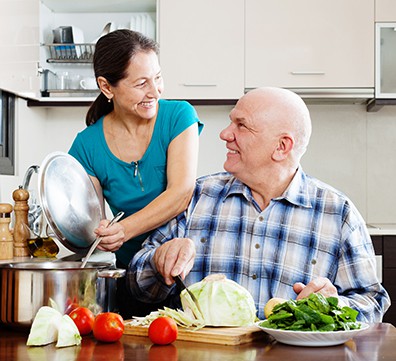Cooking provides many emotional benefits for those needing Alzheimer’s care. Including positive personal interactions, the experience of familiar routines to stir memories, and the ability to maintain a sense of self-worth and independence.
In many advice columns and informational resources for caregivers of loved ones with Alzheimer’s care needs, you’re likely to find recommendations that suggest unplugging the stove. There’s solid reasoning behind this advice: Some people who suffer from Alzheimer’s disease may begin to cook but lose track of what they’re doing partway through the process. Forgetting the stove is on can be disastrous.
There are valid safety reasons for preventing loved ones with Alzheimer’s disease from inadvertently putting themselves in harm’s way by cooking alone. There is also an abundance of valid reasons why cooking can be a beneficial activity for people who have Alzheimer’s disease – all the better when it means spending quality time with someone about whom they care.
We’ve put together this comprehensive guide encompassing the cognitive, emotional, and other health-related benefits of cooking for people with Alzheimer’s disease. The guide shows how to create a safe environment for cooking and baking, ways caregivers can assist to make the activity enjoyable, and addressing eating challenges that may arise among individuals suffering from Alzheimer’s disease.
Emotional Benefits of Cooking for those needing Alzheimer’s care
 The following resources offer information on the cognitive and other health benefits of cooking with Alzheimer’s and the positive effects of being able to continue participating in activities that were once enjoyable.
The following resources offer information on the cognitive and other health benefits of cooking with Alzheimer’s and the positive effects of being able to continue participating in activities that were once enjoyable.
Music and food preparation are both noted as positive activities that can help with behavior problems for people with Alzheimer’s disease or dementia. As a bonus, these activities often offer stress-relieving benefits for caregivers, as well. This resource describes the results of a study, which found that two one-hour sessions weekly over a four week period produced improvements in patients’ average behavioral scores and caregivers’ average distress scores.
Washing up, cooking, and cleaning represent activities that can reduce the risk of Alzheimer’s disease, even in individuals who are over 80. This article from the U.K.’s Daily Mail reveals the findings of research that show the benefits of moderate, everyday activities such as cooking and cleaning in potentially warding off Alzheimer’s disease.
Even in the early, mild stage of Alzheimer’s disease, sufferers may lose interest in activities that they once enjoyed, such as cooking. Finding ways to make these once-enjoyable activities more pleasurable and functional for a person with Alzheimer’s disease can help them to maintain their sense of self and purpose.
By remaining active and continuing to do the things they once enjoyed, people with Alzheimer’s disease are often able to maintain their skills and independence longer. This resource from the Alzheimer’s Society outlines the many benefits of staying active and involved for people with Alzheimer’s disease.
Cooking is among the Instrumental Activities of Daily Living (IADLs). Caregivers typically have to play an increasingly larger role in aiding with these activities as Alzheimer’s disease progresses. This resource offers a helpful explanation of how the caregiver’s role may evolve over time and how to allow a person with Alzheimer’s disease to maintain as much independence as possible.
The Montessori Method is one method that’s gaining ground as a means of working with Alzheimer’s sufferers. As the Montessori Method involves engaging individuals through the five senses, cooking is one activity that fits into this methodology and helps Alzheimer’s patients to connect with the world around them.
Emotional Benefits of Cooking with Alzheimer’s
The following resources provide information on the emotional benefits of cooking with Alzheimer’s, such as facilitating positive personal interactions, the ability for familiar routines to stir memories, and the ability to maintain a sense of self-worth and independence.
Continuing to participate in activities and hobbies they once enjoyed is important for people with Alzheimer’s disease. These pursuits can stir memories, help to build or strengthen emotional bonds and connections with others, help them to feel more engaged with life, and even reduce feelings of stress and anxiety or irritability, which Alzheimer’s disease often brings.
Many activities for people with Alzheimer’s disease are designed to help maintain a person’s abilities, dignity, and self-worth. This resource offers guidance for planning activities that can help caregivers understand how to incorporate meaningful activities that will serve to achieve these goals.
Therapeutic cooking activities can reduce passivity and agitation among people with Alzheimer’s disease or dementia. This study evaluated the effects of therapeutic cooking activities and discusses the essential meaning of food and cooking to older adults, making cooking activities an effective way to reduce the undesired emotional and behavioral side effects of Alzheimer’s disease.
Being in a supportive environment and having positive personal interactions are among external factors that can contribute to “pleasant dementia.” As this article explains, there are usually a few things that have profoundly influenced an individual’s life, and caregivers who can create connections between today and these pleasant, passion-inducing topics contribute to feelings of joy and excitement. For some people with Alzheimer’s, activities such as cooking a holiday meal evoke such pleasant emotions.
There exists a clear link between negative emotions and unhealthy eating. While this resource doesn’t specifically examine these effects in people who suffer from Alzheimer’s, rather people in general. It is worth noting that an unhealthy diet can have a negative impact on emotions. All the more reason to help to ensure your loved ones and care recipients are consuming a healthy diet rich in vitamins and nutrients. Additionally, many individuals are exploring alternative methods such as CBD/THC products for pain relief and stress.
This blog is based on work originally published on www.culinaryarts.org.
The original article is found here: https://www.culinaryschools.org/blog/cooking-with-alzheimers/

